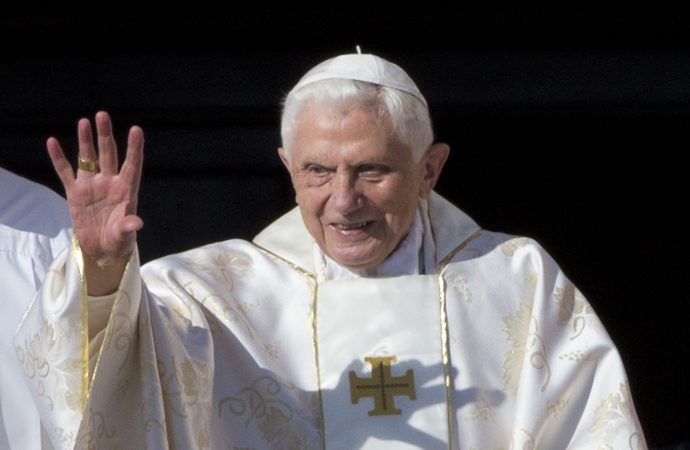Over the last ten days, four major milestones have been marked in the U.S. and elsewhere:
- The 20th anniversary of the Columbine High School shootings (April 20)
- The 25th anniversary of the death of former U.S. President Richard Nixon (April 22)
- The 130th anniversary of the birth of Adolph Hitler (April 20)
- The 92nd birthday of Pope emeritus Benedict XVI (April 16)
At first glance, putting those four things together almost seems a classic SAT question about “which item does not belong in this list?” The first three seem reminders of a world gone mad - National Socialism, the Watergate scandal, and the scourge of school violence.
Benedict, on the other hand, is one of the most celebrated theological minds in contemporary Catholicism, a figure who inspires intense devotion among a wide swath of the Catholic population.
Yet there’s a scarlet thread running through all four, because one of the cornerstones of Benedict’s thought over the years has been precisely a deep reflection on how such social evil is possible, and how the Church can best resist it. It’s a controversial diagnosis, and, for exactly that reason, it points to one of those deep tectonic fault lines in Catholicism that underlie a host of surface debates.
A key point of reference is a lecture then-Cardinal Joseph Ratzinger delivered in 1986 at St. Michael’s College in Toronto, while he was still the prefect of the Vatican’s Congregation for the Doctrine of the Faith and, in effect, the intellectual architect of the papacy of St. Pope John Paul II.
His talk was titled “The Spiritual Basis and Ecclesial Identity of Theology,” and it was vintage Ratzinger - arguing lucidly and firmly that Catholic theology has to be tightly tethered to church authority and its teaching office, or it loses its identity.
What’s of interest isn’t so much Ratzinger’s conclusion, but the intellectual path he took to get there. He begins with a reflection on the experience of Protestantism in Germany under the Nazis, and the way it splintered into an official church supporting the Nazis and a “confessing church” opposing the regime.
Those Protestant thinkers who stood firm against the Brown Shirts, Ratzinger said, came to understand that “theology either exists in the church and from the church, or it does not exist at all.”
His bottom line was that a theology that distances itself from church authority makes itself a plaything of other forces. Theology either serves the church, or it serves the political and cultural consensus of the moment.
Later, in a 1991 address to the U.S. bishops on conscience, Ratzinger drove the point home.
“What characterizes man as man is not that he asks about the ‘can’ but about the ‘should’ and that he opens himself to the voice and demands of truth,” he said.
“It seems to me that this was the final meaning of the Socratic search, and it is the profoundest element in the witness of all martyrs. They attest to the fact that man’s capacity for truth is a limit on all power,” Ratzinger said.
That’s what Ratzinger meant when he warned of a “dictatorship of relativism” in his homily at the 2005 Mass Pro Eligendo Romano Pontefice, his last public address before his election as pope.
That’s also what he meant when, as pope, he wrote to the bishops of the world after his decision to lift the excommunications of four traditionalist bishops.
“The real problem at this moment of our history is that God is disappearing from the human horizon, and, with the dimming of the light which comes from God, humanity is losing its bearings, with increasingly evident destructive effects,” he said.
In a sense, it’s also the same point Benedict tried to make in his recent essay on the clerical sexual abuse crisis that caused such a tempest. While the hubbub focused on his line about “homosexual cliques” in seminaries and whether he was blaming gays, his ultimate diagnosis was that the real culprits are a loss of faith in God and a collapse of confidence in objective truth.
Once again, his central idea is that only truth - clearly defined, robustly proclaimed, and, when necessary, unabashedly defended, as he suggests John Paul II did with his 1993 encyclical Veritatis splendor - sets limits to the evils sinful human beings are capable of inflicting on one another.
In other words, demanding that Catholics accept and profess the truths proclaimed by the Church’s magisterium isn’t authoritarianism, it’s compassion and humanitarianism.
To say the least, that’s a contested position. Many Catholics would argue that what truly sets limits to power is the individual conscience and its refusal to engage in blind obedience, even to ecclesiastical authority. Which of those instincts a given Catholic finds more persuasive cuts across a multitude of tensions, forming a key front in the Church’s contemporary “wars of culture.”
Nevertheless, Benedict’s query can’t be avoided: Is a church wobbly on its core convictions, lacking the internal cohesion to mount a unified front, truly capable of standing up to the pressures of this world?
While the answer may be elusive, the milestones we’ve marked lately - Columbine, the Nixon legacy, and Hitler and the shadow he casts to this day - all seem to illustrate that the question still packs a wallop. Certainly nothing about the last ten days, including last Sunday’s carnage in Sri Lanka, suggests its relevance is diminishing.

